Unit 10 You're supposed to shake hands. Section A (1a~2d) 课件+嵌入音频(共37张PPT) 2024-2025学年人教版英语九年级全一册
文档属性
| 名称 | Unit 10 You're supposed to shake hands. Section A (1a~2d) 课件+嵌入音频(共37张PPT) 2024-2025学年人教版英语九年级全一册 |
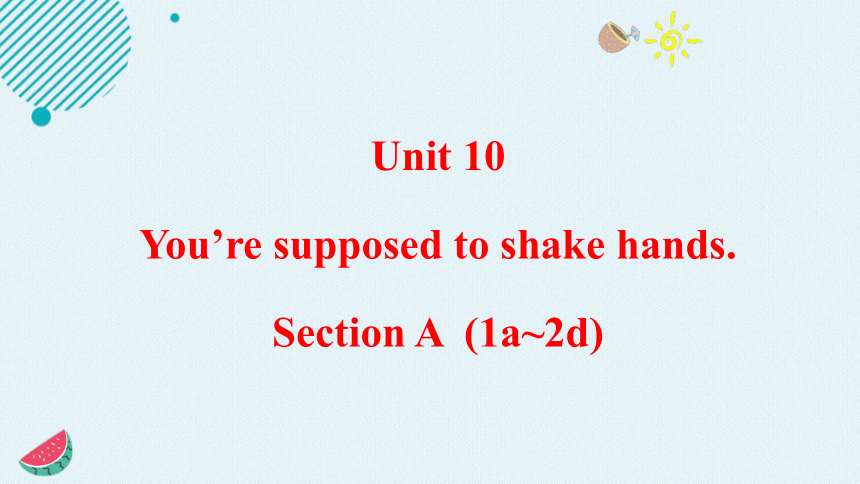
|
|
| 格式 | pptx | ||
| 文件大小 | 4.7MB | ||
| 资源类型 | 教案 | ||
| 版本资源 | 人教新目标(Go for it)版 | ||
| 科目 | 英语 | ||
| 更新时间 | 2024-07-21 22:19:28 | ||
图片预览

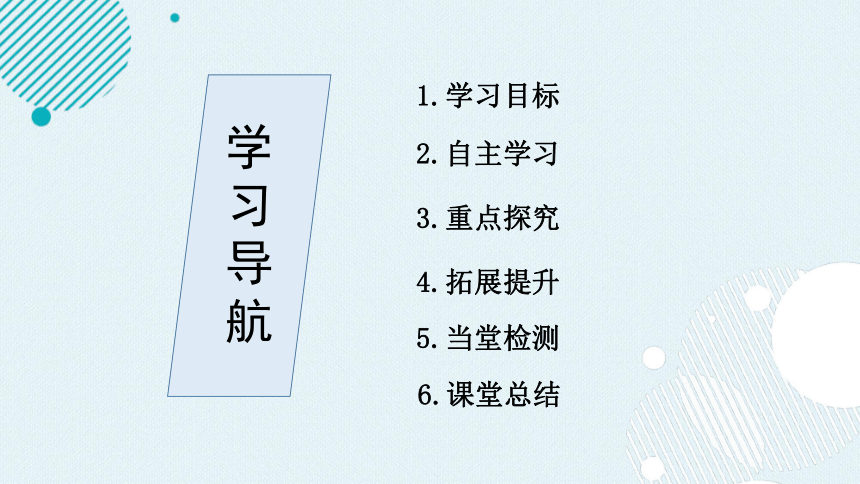
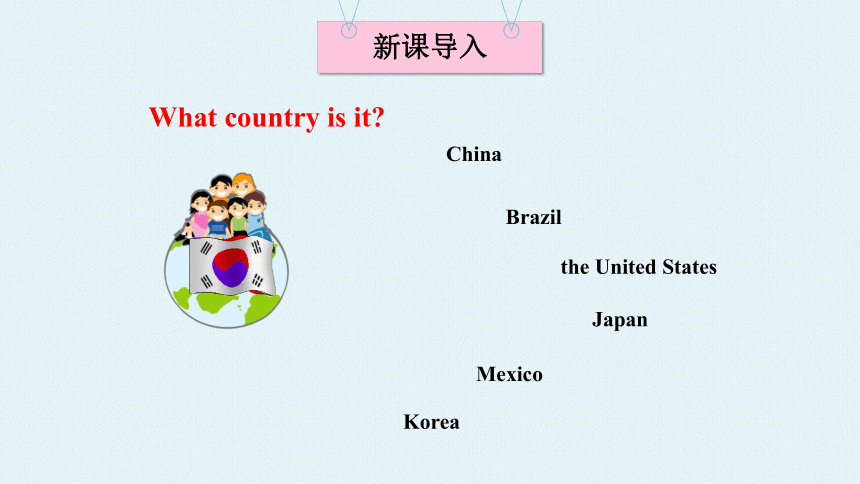
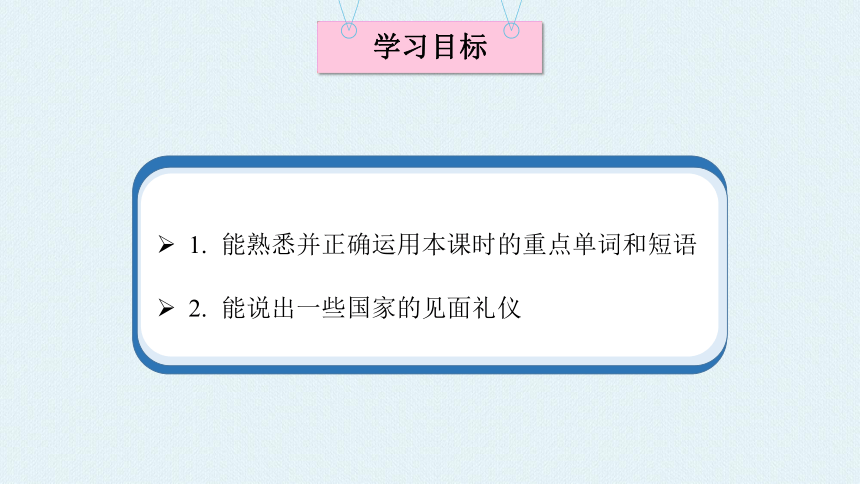
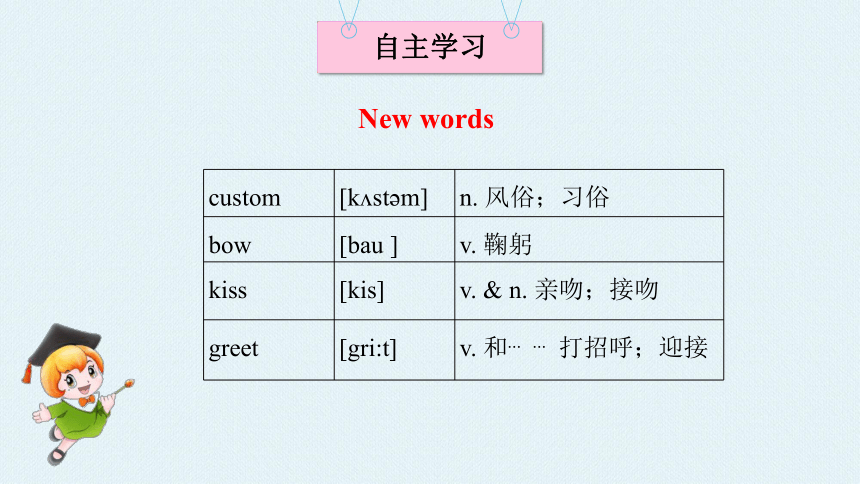
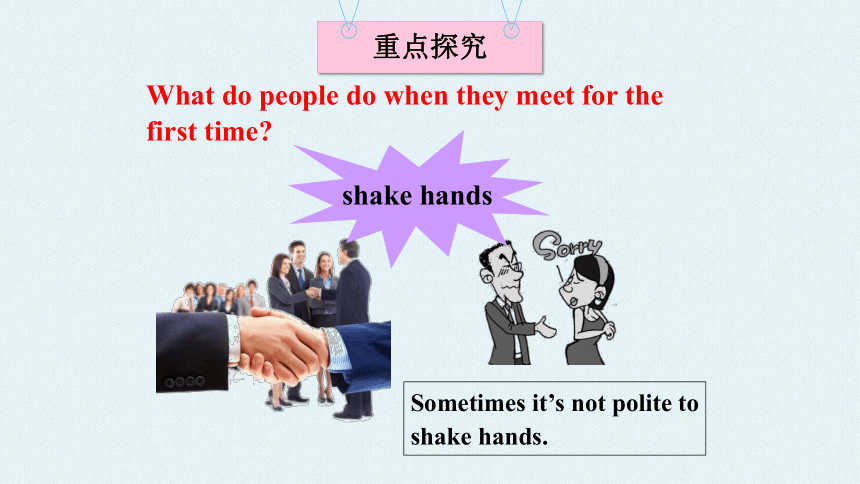
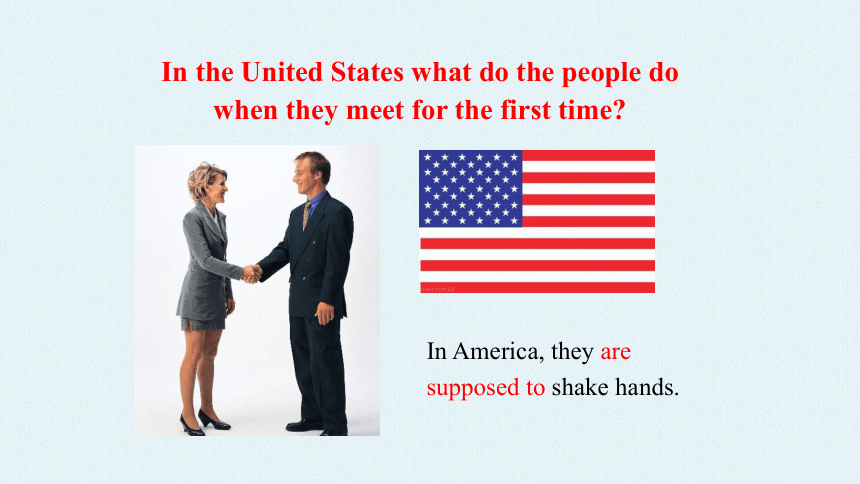
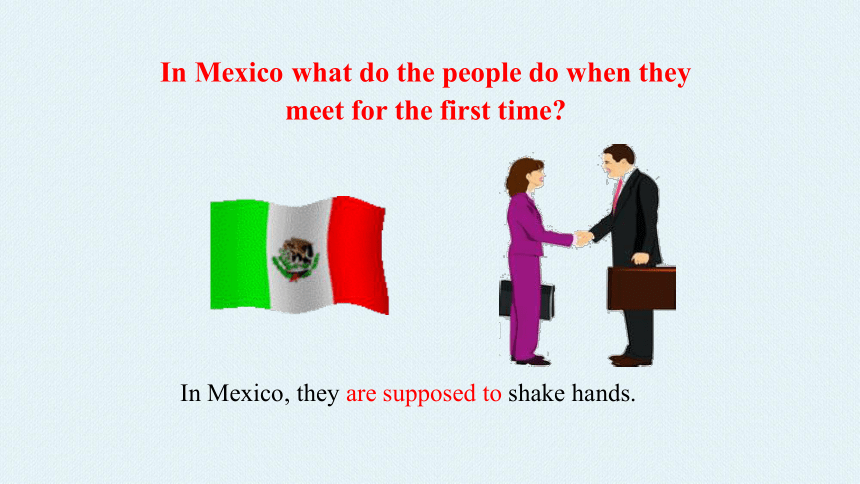
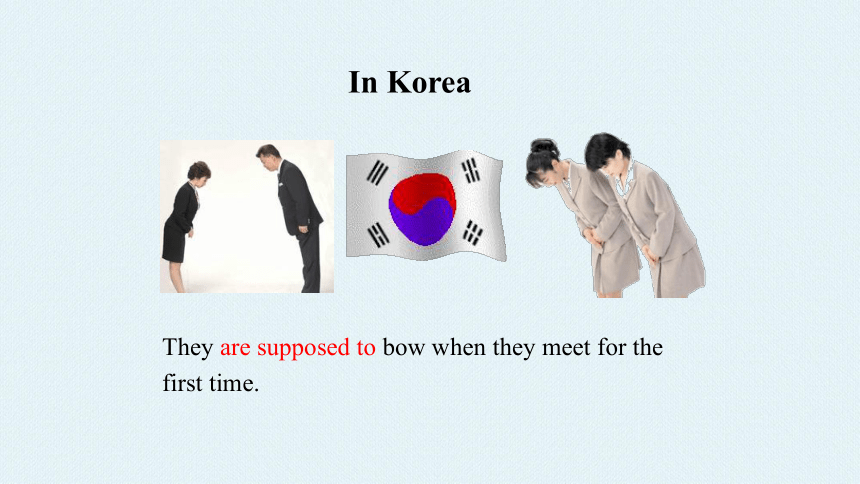
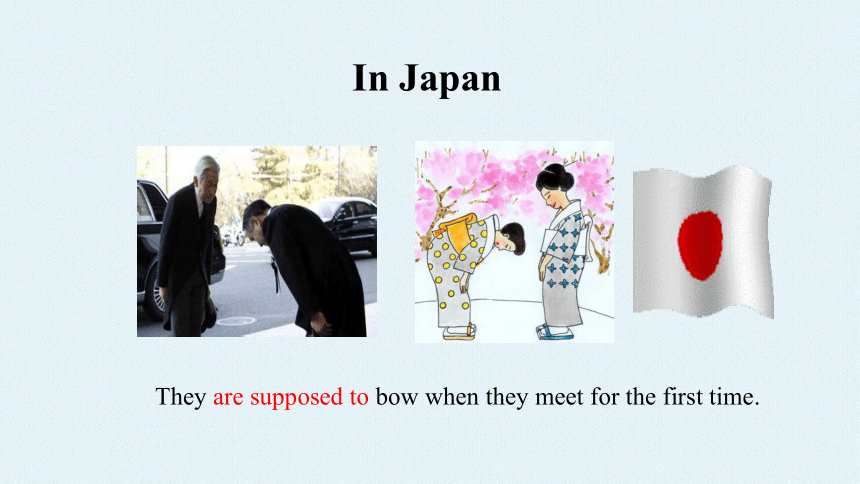
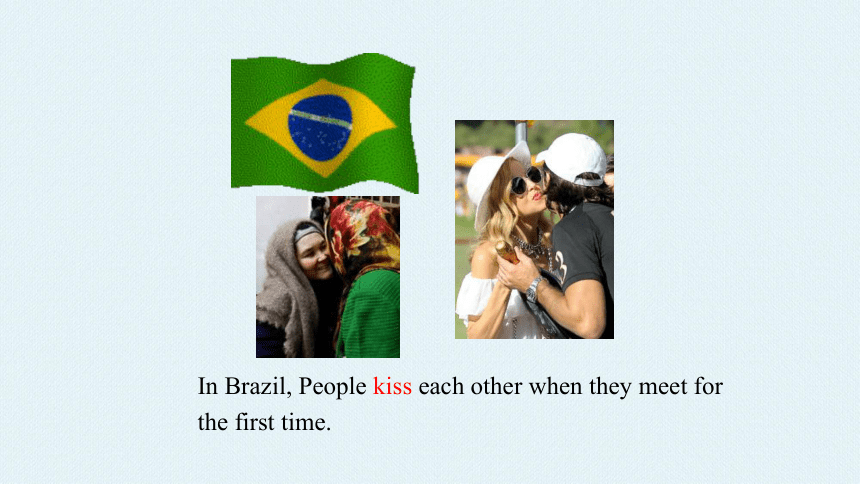
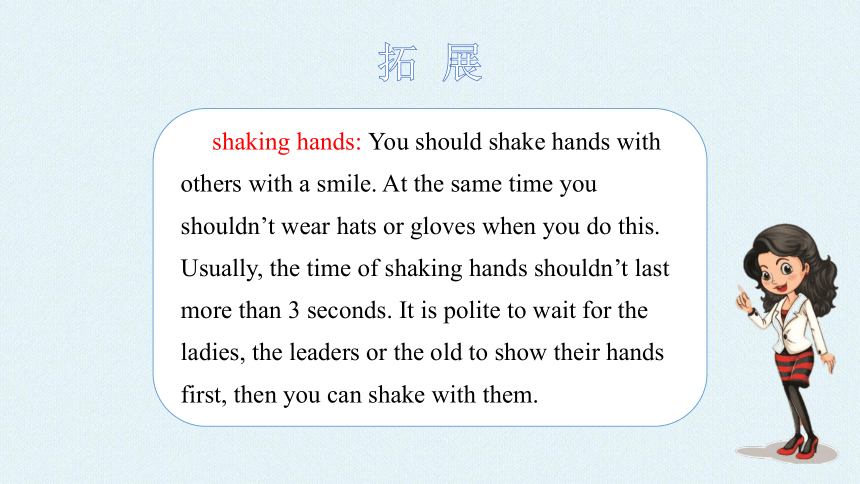
文档简介
(共37张PPT)
Unit 10
You’re supposed to shake hands.
Section A (1a~2d)
1.学习目标
3.重点探究
2.自主学习
学习导航
5.当堂检测
6.课堂总结
4.拓展提升
新课导入
Brazil
Korea
Japan
the United States
Mexico
What country is it
China
学习目标
1. 能熟悉并正确运用本课时的重点单词和短语
2. 能说出一些国家的见面礼仪
自主学习
New words
custom [k st m] n. 风俗;习俗
bow [bau ] v. 鞠躬
kiss [kis] v. & n. 亲吻;接吻
greet [gri:t] v. 和 打招呼;迎接
重点探究
What do people do when they meet for the first time
shake hands
Sometimes it’s not polite to shake hands.
In the United States what do the people do when they meet for the first time
In America, they are supposed to shake hands.
In Mexico, they are supposed to shake hands.
In Mexico what do the people do when they meet for the first time
They are supposed to bow when they meet for the first time.
In Korea
In Japan
They are supposed to bow when they meet for the first time.
In Brazil, People kiss each other when they meet for the first time.
拓 展
shaking hands: You should shake hands with others with a smile. At the same time you shouldn’t wear hats or gloves when you do this. Usually, the time of shaking hands shouldn’t last more than 3 seconds. It is polite to wait for the ladies, the leaders or the old to show their hands first, then you can shake with them.
bow: When you bow to others, you should stand at attention and take off your hat to show your respect.
kiss: If you meet a friend or your relative, you can greet him or her with a hug or a kiss on the cheeks. If you are a couple, you can hug and kiss, but if you are parents and children, you just kiss on the face or forehead. If you are brothers or sisters, you just kiss
on the cheeks.
1a What do people do when they meet for the first time
Match the countries with the customs.
n. 风俗;
习惯
countries customs
_____ Brazil _____ the United States 3. _____ Japan 4. _____ Mexico 5. _____ Korea a. bow
b. shake hands
c. kiss
b
1b Listen and check your answers in 1a.
countries customs
_____ Brazil _____ the United States _____ Japan _____ Mexico _____ Korea a. bow
b. Shake hands
c. kiss
c
b
a
b
a
1c Make conversations about what people in different countries
do when they meet for the first time. Talk about the countries
in 1a or other countries.
A: What are people in Korea supposed to do when they meet
for the first time
B: They’re supposed to bow. How about in the United States
A: In the United States, they’re expected to shake hands.
…
2a Maria is an exchange student. Last night she had dinner
at an American friend’s house. Listen and check (√) the
mistakes Maria make.
Maria’s mistakes
_______ arrived late
_______ ate the wrong food
_______ greeted Paul’s mother the
wrong way
_______ wore the wrong clothes
2b Listen again. Fill in the blanks.
Maria was supposed to arrive at 7:00, but she _____________.
2. In Maria’s country, when you’re invited for 7:00, you’re expected to ___________.
3. When Maria met Paul’s mom, she was supposed to
___________.
4. Maria should ask what she is supposed to _______ if she is invited to a party next time.
arrived at 8:00
come later
wear
shake hands
2c Role-play a conversation between Maria and Dan.
Use the information in 2a and 2b.
How was the dinner at Paul’s house last night
Well, it was OK, but I made some mistakes. I was supposed to arrive at 7:00, but…
2d Role-play the conversation.
How was the welcome party for foreign students last night
Great! I made some new friends. But a funny thing happened.
What
I met a Japanese boy called Sato, and as soon as I held out my hand, he bowed.
That’s how people in Japan are expected to greet each other. It’s impolite if you don’t bow.
Role-play
I didn’t know that. So I just stood there with my hand out. Finally, I returned the bow.
I remember when I first met Marie last year, I did the same thing. I held out my hand and to my surprise, she kissed me on both sides of my face!
Role-play
I wouldn’t mind that!
Very funny. Later I found out French people are supposed to kiss when they see each other.
Role-play
Countries Customs
France kiss
Japan bow
Korea bow
Brazil kiss
The United States shake hands
Mexico shake hands
China shake hands
… …
Different Customs
拓展提升
Language points
1.You are supposed to shake hands.
be supposed to do sth. 应该做某事;被期望做某事。
当句子的主语是人时,它可以用来表示劝告,建议,义务,
责任等,意思是 “be expected to do sth, or have to do sth.”
e.g. We are not supposed to play football on Sunday.
我们不应该在星期天踢足球。
2. You’re expected to …
be expected to do sth. 被期望做某事/应该要做某事
e.g. He is expected to get through to the finals.
我们期待他进入决赛。
Everyone in the class is expected to take part in the
discussion.
希望全班同学参加讨论。
You will be expected to work on Saturdays.
你们星期六要上班。
3. bow v. 鞠躬,弯腰
e.g. Bow to the Queen.
向女王鞠躬致敬。
At the end of the play all the actors came onto the
stage and bowed.
终场时,全体演员都走到台前鞠躬致谢。
4. greet v. 和……打招呼;迎接
e.g. Mick greeted her with a kiss on each cheek.
米克亲吻她的双颊以表问候。
The host greeted us at the gate.
主人在大门口迎接我们。
greeting n. 问候;打招呼
e.g. He sends greetings to all the family.
他发信向全家问候。
若主语用一般将来时,从句用一般现在时表将来;
若主句用过去时,从句也要用过去时。
e.g. I will call you as soon as I get to Shanghai .
我一到上海就给你打电话。
As soon as I went in, he cried out with pleasure.
我一进门他就高兴地叫起来。
5.as soon as, 意为“一……就……”,
可引导时间状语从句。
6. hold out 伸出
e.g. She held out her hand to take the rope.
她伸手去抓那根绳子。
He laughed, holding out his cup for more tea.
他大笑,伸出杯子要给他再倒点茶。
hold on 抓住; 继续; 坚持; 忍受; (打电话时用语)别挂断hold up 举起; 阻挡; 耽搁; 支撑; 抢劫; 使停顿; 举出hold back 阻碍; 退缩; 隐藏; 克制; 隐瞒
hold off 不使挨近; 挡住; 耽搁; 离开
hold down 压制; 压缩
hold on to 紧紧抓住; 坚持; 不放弃
hold in 压住; 忍耐; 抑制
当堂检测
翻译下列句子。
1. 在大多数西方国家,人们初次见面时应该握手。
In most Western countries, people ________________________
when they meet for the first time.
2. 我们怎样才能用正确的方式与美国朋友打招呼?
How can we _____ American friends __________________
are supposed to shake hands
greet
in the / a right way
3. 你应该问一下该带什么礼物。
You should ____ what gift to take with you.
4. 如果你被邀请参加会议, 你不应该去晚了。
If you are invited to the meeting, you_______________ to ____ late.
5. 在日本,你应该鞠躬而不是握手。
You are supposed to bow ________________ hands in Japan.
aren’t supposed
be
instead of shaking
ask
课堂总结
重要语法:
be supposed to do sth. 应该做某事;被期望做某事
be expected to do sth. 被期望做某事/应该要做某事
as soon as, 意为“一……就……”
重要单词/短语:
bow v. 鞠躬,弯腰
greet v. 和……打招呼;迎接
greeting n. 问候;打招呼
hold out 伸出
Unit 10
Section A (1a~2d)
Unit 10
You’re supposed to shake hands.
Section A (1a~2d)
1.学习目标
3.重点探究
2.自主学习
学习导航
5.当堂检测
6.课堂总结
4.拓展提升
新课导入
Brazil
Korea
Japan
the United States
Mexico
What country is it
China
学习目标
1. 能熟悉并正确运用本课时的重点单词和短语
2. 能说出一些国家的见面礼仪
自主学习
New words
custom [k st m] n. 风俗;习俗
bow [bau ] v. 鞠躬
kiss [kis] v. & n. 亲吻;接吻
greet [gri:t] v. 和 打招呼;迎接
重点探究
What do people do when they meet for the first time
shake hands
Sometimes it’s not polite to shake hands.
In the United States what do the people do when they meet for the first time
In America, they are supposed to shake hands.
In Mexico, they are supposed to shake hands.
In Mexico what do the people do when they meet for the first time
They are supposed to bow when they meet for the first time.
In Korea
In Japan
They are supposed to bow when they meet for the first time.
In Brazil, People kiss each other when they meet for the first time.
拓 展
shaking hands: You should shake hands with others with a smile. At the same time you shouldn’t wear hats or gloves when you do this. Usually, the time of shaking hands shouldn’t last more than 3 seconds. It is polite to wait for the ladies, the leaders or the old to show their hands first, then you can shake with them.
bow: When you bow to others, you should stand at attention and take off your hat to show your respect.
kiss: If you meet a friend or your relative, you can greet him or her with a hug or a kiss on the cheeks. If you are a couple, you can hug and kiss, but if you are parents and children, you just kiss on the face or forehead. If you are brothers or sisters, you just kiss
on the cheeks.
1a What do people do when they meet for the first time
Match the countries with the customs.
n. 风俗;
习惯
countries customs
_____ Brazil _____ the United States 3. _____ Japan 4. _____ Mexico 5. _____ Korea a. bow
b. shake hands
c. kiss
b
1b Listen and check your answers in 1a.
countries customs
_____ Brazil _____ the United States _____ Japan _____ Mexico _____ Korea a. bow
b. Shake hands
c. kiss
c
b
a
b
a
1c Make conversations about what people in different countries
do when they meet for the first time. Talk about the countries
in 1a or other countries.
A: What are people in Korea supposed to do when they meet
for the first time
B: They’re supposed to bow. How about in the United States
A: In the United States, they’re expected to shake hands.
…
2a Maria is an exchange student. Last night she had dinner
at an American friend’s house. Listen and check (√) the
mistakes Maria make.
Maria’s mistakes
_______ arrived late
_______ ate the wrong food
_______ greeted Paul’s mother the
wrong way
_______ wore the wrong clothes
2b Listen again. Fill in the blanks.
Maria was supposed to arrive at 7:00, but she _____________.
2. In Maria’s country, when you’re invited for 7:00, you’re expected to ___________.
3. When Maria met Paul’s mom, she was supposed to
___________.
4. Maria should ask what she is supposed to _______ if she is invited to a party next time.
arrived at 8:00
come later
wear
shake hands
2c Role-play a conversation between Maria and Dan.
Use the information in 2a and 2b.
How was the dinner at Paul’s house last night
Well, it was OK, but I made some mistakes. I was supposed to arrive at 7:00, but…
2d Role-play the conversation.
How was the welcome party for foreign students last night
Great! I made some new friends. But a funny thing happened.
What
I met a Japanese boy called Sato, and as soon as I held out my hand, he bowed.
That’s how people in Japan are expected to greet each other. It’s impolite if you don’t bow.
Role-play
I didn’t know that. So I just stood there with my hand out. Finally, I returned the bow.
I remember when I first met Marie last year, I did the same thing. I held out my hand and to my surprise, she kissed me on both sides of my face!
Role-play
I wouldn’t mind that!
Very funny. Later I found out French people are supposed to kiss when they see each other.
Role-play
Countries Customs
France kiss
Japan bow
Korea bow
Brazil kiss
The United States shake hands
Mexico shake hands
China shake hands
… …
Different Customs
拓展提升
Language points
1.You are supposed to shake hands.
be supposed to do sth. 应该做某事;被期望做某事。
当句子的主语是人时,它可以用来表示劝告,建议,义务,
责任等,意思是 “be expected to do sth, or have to do sth.”
e.g. We are not supposed to play football on Sunday.
我们不应该在星期天踢足球。
2. You’re expected to …
be expected to do sth. 被期望做某事/应该要做某事
e.g. He is expected to get through to the finals.
我们期待他进入决赛。
Everyone in the class is expected to take part in the
discussion.
希望全班同学参加讨论。
You will be expected to work on Saturdays.
你们星期六要上班。
3. bow v. 鞠躬,弯腰
e.g. Bow to the Queen.
向女王鞠躬致敬。
At the end of the play all the actors came onto the
stage and bowed.
终场时,全体演员都走到台前鞠躬致谢。
4. greet v. 和……打招呼;迎接
e.g. Mick greeted her with a kiss on each cheek.
米克亲吻她的双颊以表问候。
The host greeted us at the gate.
主人在大门口迎接我们。
greeting n. 问候;打招呼
e.g. He sends greetings to all the family.
他发信向全家问候。
若主语用一般将来时,从句用一般现在时表将来;
若主句用过去时,从句也要用过去时。
e.g. I will call you as soon as I get to Shanghai .
我一到上海就给你打电话。
As soon as I went in, he cried out with pleasure.
我一进门他就高兴地叫起来。
5.as soon as, 意为“一……就……”,
可引导时间状语从句。
6. hold out 伸出
e.g. She held out her hand to take the rope.
她伸手去抓那根绳子。
He laughed, holding out his cup for more tea.
他大笑,伸出杯子要给他再倒点茶。
hold on 抓住; 继续; 坚持; 忍受; (打电话时用语)别挂断hold up 举起; 阻挡; 耽搁; 支撑; 抢劫; 使停顿; 举出hold back 阻碍; 退缩; 隐藏; 克制; 隐瞒
hold off 不使挨近; 挡住; 耽搁; 离开
hold down 压制; 压缩
hold on to 紧紧抓住; 坚持; 不放弃
hold in 压住; 忍耐; 抑制
当堂检测
翻译下列句子。
1. 在大多数西方国家,人们初次见面时应该握手。
In most Western countries, people ________________________
when they meet for the first time.
2. 我们怎样才能用正确的方式与美国朋友打招呼?
How can we _____ American friends __________________
are supposed to shake hands
greet
in the / a right way
3. 你应该问一下该带什么礼物。
You should ____ what gift to take with you.
4. 如果你被邀请参加会议, 你不应该去晚了。
If you are invited to the meeting, you_______________ to ____ late.
5. 在日本,你应该鞠躬而不是握手。
You are supposed to bow ________________ hands in Japan.
aren’t supposed
be
instead of shaking
ask
课堂总结
重要语法:
be supposed to do sth. 应该做某事;被期望做某事
be expected to do sth. 被期望做某事/应该要做某事
as soon as, 意为“一……就……”
重要单词/短语:
bow v. 鞠躬,弯腰
greet v. 和……打招呼;迎接
greeting n. 问候;打招呼
hold out 伸出
Unit 10
Section A (1a~2d)
同课章节目录
- Unit 1 How can we become good learners.
- Section A
- Section B
- Unit 2 I think that mooncakes are delicious!
- Section A
- Section B
- Unit 3 Could you please tell me where the restroom
- Section A
- Section B
- Unit 4 I used to be afraid of the dark.
- Section A
- Section B
- Unit 5 What are the shirts made of?
- Section A
- Section B
- Review of Units 1-5
- Unit 6 When was it invented?
- Section A
- Section B
- Unit 7 Teenagers should be allowed to choose their
- Section A
- Section B
- Unit 8 It must belong to Carla.
- Section A
- Section B
- Unit 9 I like music that I can dance to.
- Section A
- Section B
- Unit 10 You're supposed to shake hands.
- Section A
- Section B
- Review of Units 6-10
- Unit 11 Sad movies make me cry.
- Section A
- Section B
- Unit 12 Life is full of the unexpected
- Section A
- Section B
- Unit 13 We're trying to save the earth!
- Section A
- Section B
- Unit 14 I remember meeting all of you in Grade 7.
- Section A
- Section B
- Review of Units 11-14
